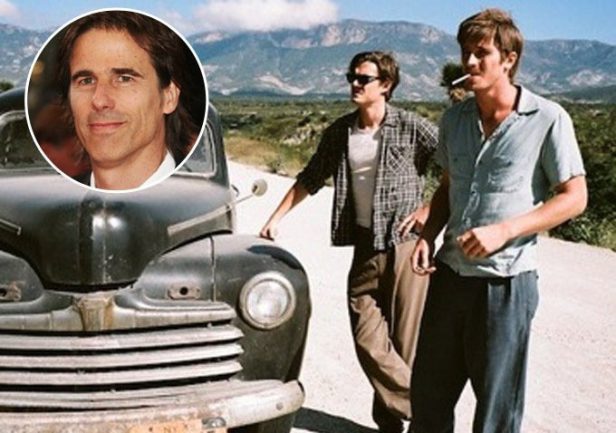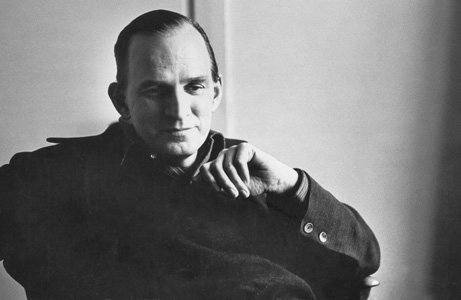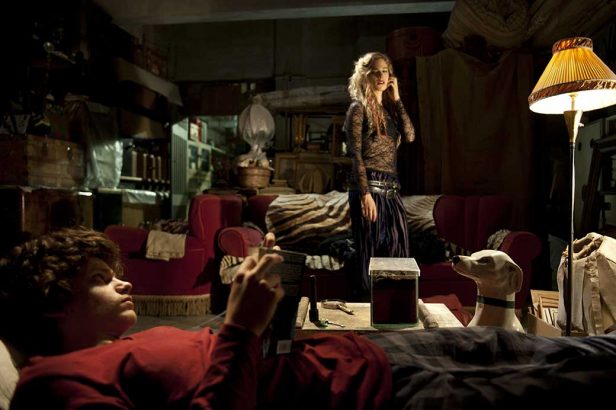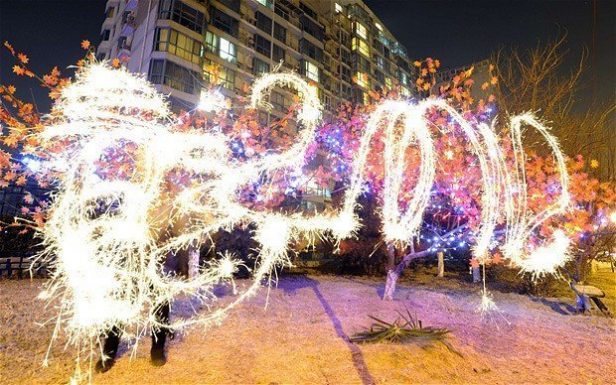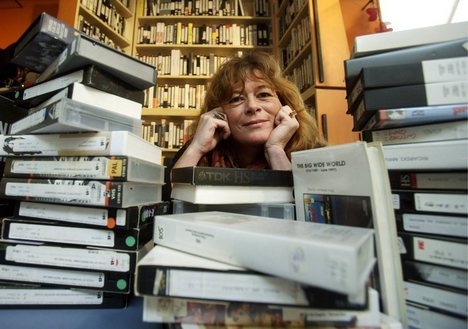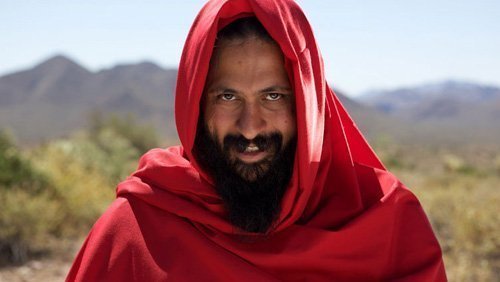Silence is a Falling Body
As the IDFA festival unfolded during its 30th edition, I got a chance to speak to Augustina Comedi, director of the feature length film: Silence is a falling body. I was introduced by a friend interested in gender issue related films and I had no expectations whatsoever before entering the screening. The film is mainly edited material coming from two sources: home video footage that was shot by Augustina’s father, who passed away when she was twelve and her own video material which mainly involves talking to relatives of herself, her mother and close friends of her father. Besides we have a non-diegetic voice-over of the director herself as we see footage of her family and others during the first 12 years of her life. The topic of the film is in one sentence: the homosexuality of her father and what she as his daughter learned about his life and times before she was born herself in Cordoba, Argentina in 1986, after he got married to her mother.

What were you able to find out researching over 100, close to 150 hours of video material shot by your father after his sudden accidental death?
AC: I found out that my father had had an openly homosexual life before marrying my mother and before I was born. And that after their marriage that part of his life was kept a secret. I first became aware of that after I found out pieces of his life around my 16th birthday.
What kind of childhood did you have?
AC: I had a happy childhood, my father and mother were very caring and loving parents. I did very well in school being a student who also played the violin well (laughs).
Why, do you believe, was his homosexuality kept a secret?
AC: Well, I believe he had to hide his sexual preferences because of the fact that he was a lawyer and being middle-upper class in Argentina in that time, it would have been something impossible to speak about or to show in public.
Do you believe apart from filming gays or transvestites he was friends with, that he had a homosexual life during the marriage he and your mother had?
AC: No, I believe that he took marriage very seriously and that it was a choice between two things that he liked a lot in life. Being gay and being a father. He also loved my mother and he was clearly a happy parent. So he hid his previous experiences with homosexuality in order to fulfill his role in the family. He stopped seeing his friends and felt a lot of pressure on him being a good father and a husband.
What would have happened if he had been openly homosexual?
AC: Argentina was still quite tough around the mid-eighties and into the nineties, so he would have had to face severe punishment by the government. His friends all went through that. It certainly would have been more difficult for him to work as a lawyer. And for sure he would not have had a kid if he had been open about his true sexual nature. He could not speak in such terms openly and he would have to quit the idea of being or becoming a father. Society made him chose between two things he liked best in life:being a good father to a family and his sexual desires.
Do you believe he was a good and happy parent?
AC: Yeah, he was a very loving parent.I felt that his secret did not make him very happy and that he loved my mother too, but it was too much of a pressure hiding his past.
What would be the difference between the kind of pressure that the Argentinian government would put on him today in relation to that in which you grew up in?
AC: Now we have an equal homosexual marriage law, so to speak, meaning that both parents can be a parent to a child and not just the mother or father. It is all quite open and liberal now, but I would like to say that we can never be too sure about what is coming next. I mean that, although things are this way now, it does not imply that in the future it will stay this way, as we have seen many swings to the right or conservative ideologies in the past in a mere instant. We have to stay aware of the human rights we have obtained and that they are vulnerable.
Are you yourself lesbian or would you like to lead a bisexual life perhaps?
AC: I am bisexual and at this moment my girlfriend ..is a woman. So, I live a lesbian life (laughs). That is the issue with bisexuality: if you are with a man, people will think you are supposedly straight and a normal hetero like anyone else. But when – as a bisexual person- you as a woman have a relationship with a woman or a girl…suddenly you are lesbian.It is difficult to consider bisexuality as an identity. I live very openly and it is not easy anyway as I have a child too. And it is difficult for others sometimes to understand how one can be a good parent and at the same time be a lesbian. In that way it is still tricky; not so much in relation to our government but in a cultural context, towards society.
Tell me about your kid!
AC: Kid’s beautiful! ( giggle) He is very nice. He understands everything. I feel that kids have their minds completely open and that we are the ones that set structures and teach them how to be more close-minded. Instead of dreaming and thinking of all the possibilities.Yeah, I think he was born in a very open house and for sure we – me and his father -make all sorts of mistakes as parents, but he is a happy boy.
Is he in any way like your own father?
AC: No, not really. My father was a collector, who enjoyed and loved art very much and enjoyed filming quite a lot like Luca’s father and myself who are both directors.Luca, my son, wants everything to be tidy. He is practical and would maybe care to become a scientist. And he laughs at me because I am more distracted. He is really different from us. He is only six years of age, so we’ll see when he grows up.
There is a large future ahead of him, which we probably – at this stage- cannot say anything about! (both laugh).How did being a child, losing a father and then becoming a parent yourself influence you?
AC: I think Luca was the final step towards truly deciding to make this film. It is a personal story but also a political one. But, after I got Luca, I really felt the need to talk about these things that happened within my family. With films, we try to trigger certain things and I would for him to be able to live in a free world, a world in which freedom is respected. I guess he made me want to do something with my own story and change something for the better for him.
When your father was around 16, he was juridically condemned for his conduct. The narrative in the film also mentioned that he was put on trial after being betrayed by one of his friends. You also mention that the judge in the court case was also gay and even close friends with him.What would he have gone through, you believe, if he had decided to stick to his homosexual nature or passions instead of choosing the ‘safe way’ of marriage?
AC: He was very young and he was already kicked out from doing his job, working for the state, for being homosexual. He was in prison for a while…
For doing what?
AC: For kissing in the street. With a man. Or holding hands. I don’t exactly now, to be honest. He was taken to jail for a couple of weeks during the military coup. When I interviewed his friends they had all gone through this in similar ways. The state- no rather the mental care institutions really-, practiced electroshock therapy. Many of them they were imprisoned and could not get jobs. It is only 30 to 40 years ago and it is was quite hard for all of them.
Did the Argentinian state document homosexuality in their documents with a black cross or a red star or anything similar for example?
AC: The international health organization had ‘homosexuality’ as a pathology listed until the 80-ies. So yeah, the government regarded homosexuality either as a disease or simply as breaking the law. ‘Provoking the carnal act’, something like that. If you were walking the street and not acting masculine as a man..
Can you yourself hold hands with your girlfriend in Argentina now?
AC: Holding hands? Yes, you can, but you are always exposed to others saying stuff. You feel how people stare at you and that they reject your behavior. If there is a child on the spot and you kiss in the streets, people will get nervous and they feel that you are not respecting the child. But I have a child.
How does your son like your girlfriend?
AC: He likes her a lot. They are just friends. My partner does not have to raise him or take any responsibility over him or anything. She has the easy part.
And what about his father?
AC: He is heterosexual and has a very open mind. We are all good friends. His father and me, we were a couple before and together we sailed around the world for 4 years. But then we broke up. I loved him a lot. I still do, but love changes.
What will you say to your (future) children?
AC: I won’t have any more children! (laughs) But I will say, that we need to create and guarantee a world with more freedom and respect. I feel diversity is very important: people having different ways of being, dressing, sharing different values or tastes. I don’t know; I find that beautiful.
Do you feel safe if you walk the streets of Amsterdam?
AC: Well, I felt safe for three days and then a girl was punched in the face by some young guys, because she had been kissing a girl. She is also one of the participants in the IDFA festival and before, I had thought I had come in a place where these attacks do not occur. I realized, that these acts of violence happen all over the world. So, it is not that I feel really safe, but it is a beautiful city.In small towns in Argentina, people are not used to big city life and diversity and people can be totally opposed to anything away from the habitual. I believe the state has a large task, if not obligation, to teach young people the values of a diverse society. So it can arrive anywhere and not just to big cities.
Will your film be shown in Argentina?
AC: Yes, first we will go to all sorts of festivals and then we will show it in Argentina too.
Could you come and live here?
AC: Yes, I could, perhaps. I live in Buenos Aires now and I like traveling. The good thing about being a filmmaker and making documentaries is that you travel a lot and you expose yourself to a variety of places and people.
Shall we have a beer then?
AC: Yes, please! I love beer!
El silencio es un cuerpo que cae · Silence is a Falling Body | TRAILER from Kino Rebelde on Vimeo.

